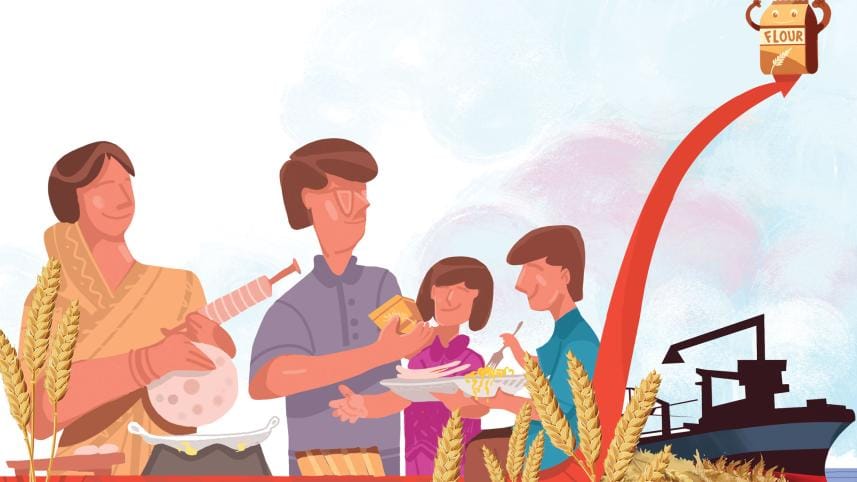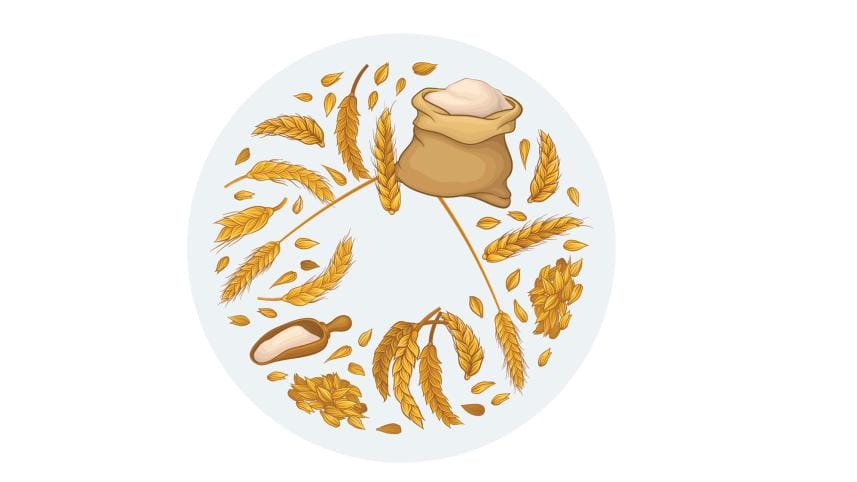Rolling in dough, running on imports

Bangladesh's wheat story involves both growth and risk. On the one hand, urbanisation and rising incomes have made flour-based foods part of daily life, turning the industry into a multi-million-tonne giant. On the other hand, over 85 per cent of that wheat comes from abroad, leaving prices, supply, and even breakfast bread and paratha vulnerable to wars, bans, and shipping shocks.
From stoves to bakery ovens to factory lines, wheat now underpins far more of daily life than a decade ago. Official estimates put the country's wheat food use at about 7.7–7.8 million tonnes a year, while domestic output is near 1.1 million tonnes. That leaves roughly 6.6–6.7 million tonnes to be imported, and recent marketing years saw imports around 6.8–6.9 million tonnes. The Ukraine war in 2022 disrupted Black Sea grain flows, spiked global prices, and forced trade patterns to shift. By FY 2023–24, much of Bangladesh's wheat came from the Black Sea region, and industry and USDA reports show Russia supplied roughly 60 per cent of imports that year, while Ukraine, Canada, and Argentina supplied most of the rest. Brazil reappeared as a supplier after a pause because of attractive price offers. The dollar shortage in 2022–24 made opening letters of credit (LC) harder. Due to this, shipments got delayed overseas.
Flour prices stayed stable in 2023–24 because the government released stocks and companies managed risks. But that calm masked higher import bills and continuous cost pressure for millers and bakers. Every shift in dollar rates or transport expenses required recalculation at the mill gate, squeezing small bakers' margins and adding uncertainty for large food makers.
Against this backdrop, leading brands like ACI, IFAD, Meghna Group, and City Group have stepped up to ensure both quality and innovation. They are investing in modern milling units, advanced European technology, and fortified flour lines. Consumers now have access to brown atta, multigrain atta, and vitamin-enriched atta in hygienically packaged staples. "We launched one of Bangladesh's first wellness-fortified flours with GAIN (Global Alliance for Improved Nutrition), enriched with folic acid, vitamin B12, iron, and zinc to combat hidden hunger," said Mahbub Baset, Chief Operating Officer of IFAD. Companies are also actively replacing loose, unpackaged flour, which once dominated the market, with branded options marketed for safety, consistency, and better nutrition. Brands are also educating consumers about food safety and offering smaller, affordable packs to make packaged flour accessible across both urban and rural markets. "We have observed a clear shift in consumer behaviour. Now more people are becoming health-conscious and are actively seeking healthier alternatives," added S.M. Muzibur Rahman, Senior General Manager and Head of Accounts of Meghna Group of Industries (MGI).
ACI highlights that consumers are shifting dynamically toward health-focused products, but balancing affordability and quality amid inflation remains tough. Baset stresses that "the greatest challenge is Bangladesh's heavy reliance on imported wheat, which makes the sector vulnerable to global disruptions." Both ACI and IFAD say the industry needs stronger policy support. They urge the government to simplify imports, improve storage and transport, and ease letters of credit during currency stress. They also suggest higher duties on low-quality wheat bran to protect local producers and digitised systems to reduce syndicate influence.
All forecasts suggest food consumption will keep rising as the population grows and urban diets change. Imports will remain critical unless local production increases or supplier networks diversify. Widening supplier bases, easing LC access during currency stress, and supporting mill modernisation and supplementation programmes can help reduce exposure.
Despite the hurdles, optimism runs high. The sector's resilience, continuous innovation, and consumer shift toward branded products suggest that Bangladesh's wheat and flour industry will continue to thrive amidst a volatile global market.





 For all latest news, follow The Daily Star's Google News channel.
For all latest news, follow The Daily Star's Google News channel.
Comments